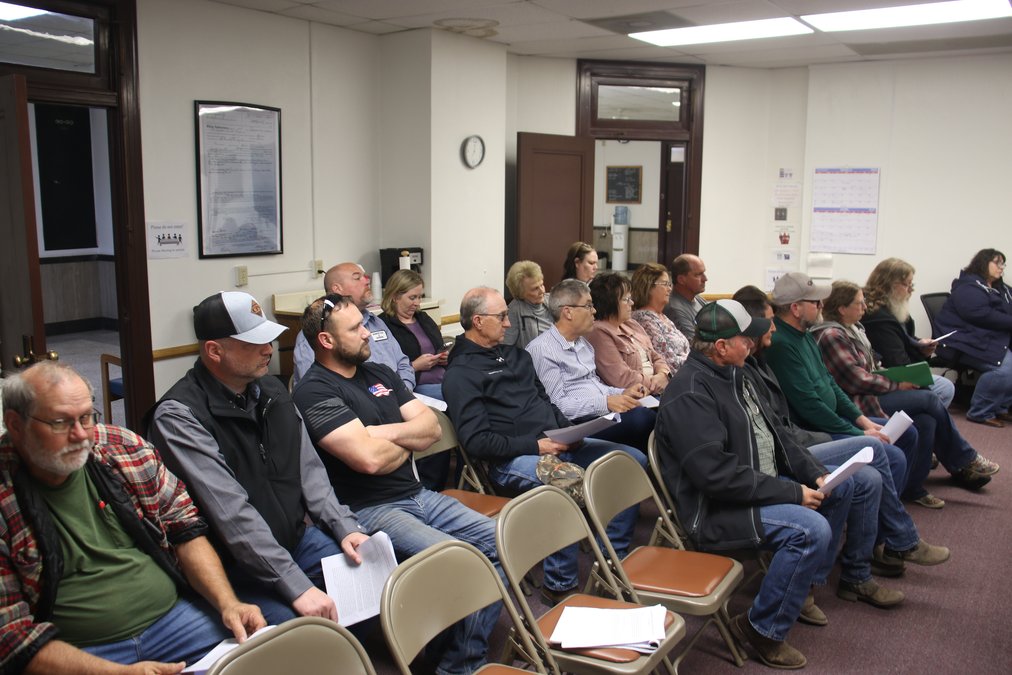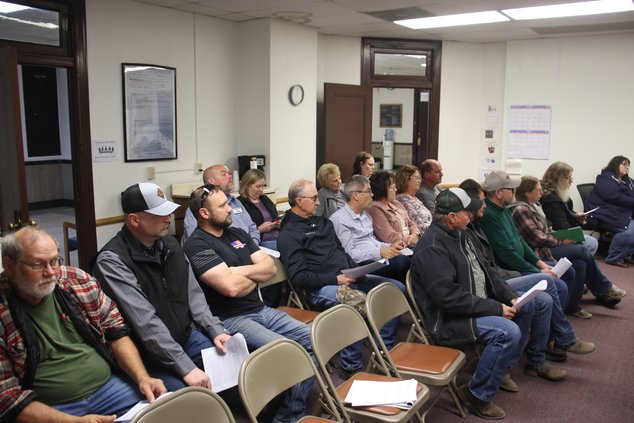LARNED — Formal action was expected Monday afternoon from the Pawnee County Commissioners regarding issues with a hay grinding operation in the eastern part of the county. At issue was the relocation of the operation due to concerns raised from nearby River Township residents in recent weeks, after the business originally understood to be temporary has continued operation for the past eight months.
As the first item on the agenda Monday morning, commissioners heard from Midwest Hay & Grinding owners Sean and Jennifer McKenna and Billy Rawlings, who presented a plan to begin relocations during a 120-day time period beginning from the day zoning regulations covering hay grinding businesses in the county were in effect.
Also in attendance Monday were Pawnee County Attorney Douglas McNett, as a representative of the Pawnee County Planning and Zoning Board; Pawnee County Sheriff Scott King; and Pam Wamser, representing the affected River Township residents.
Meeting discussion
McNett opened discussion with an update of zoning board discussion at its scheduled public hearing and study session last Thursday evening. Action at the public hearing was to deny Midwest’s application for a commercial conditional use permit allowing the operation, due to lack of a required landowner’s signature. A similar permit action submitted by Sebes Hay was tabled until regulations could be developed, recommended and approved by the commissioners.
A closed-door study session then ensued in which the board members discussed proposed parameters such as requiring a half-mile setback from any habitable structure unless waived by written agreement by both the residents and the operators; requiring an emergency safety plan with posted contact numbers on-site; and regulations on on-site hay storage; and loading and unloading time windows and other limitations.
Currently, there are no regulations specifically regarding hay grinding operations as a commercial business within the county, McNett noted.
During discussion, McKenna noted that it was always the desire of the owners to move locations, but that moving and moving again bales and the grinding equipment on site has caused commitment hardships with their contractors.
Commissioner Bob Rein spoke to the purpose of Monday’s meeting moving forward from the April 1 session.
“I don’t want to shut you down,” Rein said. “That’s not good for anybody. But what is also not good, is this perpetual back-and-forth of phone calls and other things; the man-hours must be staggering.
“It’s not like we called a meeting to rebut what you said; those people did that themselves (at the April 1 meeting) and they have the right to do that.
“I don’t want you to have to spend any more money than you have to spend, but you have to understand the process and how we got here in the first place. That’s what I want to know, is what you guys are doing going forward.
“Going forward, your proposal, whatever this board now decides to do, has got to be held to. I don’t want any more phone calls about horns honking and jake brakes, that’s it. I know you can’t control every truck driver that comes in, but you’re going to have to try.
“We need to move forward toward a mutually beneficial resolution for all parties involved,” Rein said. “But as far as the zoning regulations, the cat’s out of the bag and can’t be put back. There are procedures that have to be followed at the same time.”
Commission chairman Phillip Hammeke added his assessment of the situation.
“I will be honest, you have some very good neighbors,” Hammeke said. “I am very impressed – eight months of having dust and noise and everything else, listening to it throughout the night. That is all we’ve talked about, just being respectful. You guys came in here that day with a chip on your shoulder and I was not very happy with that.
“We understand that this is a business and you’re trying to make it work; but after eight, nine months about where you guys came in 200 feet away from a house. That’s the reason we’re here today. It comes down to the just general lack of respect and entitlement that you guys can come in and grind wherever you want without any implications.”
“I don’t feel like I came in with a chip on my shoulder, I really came in here surprised,” McKenna said. “I would say that the sooner that I can get out of there the better, and I can get on with the plans for what I want to do. That’s my goal.
“I would have been out of there by now but I still don’t know where I can go for sure. I could go to another county but that might not work for some of my employees. If I move out of Pawnee County, that takes a lot of revenues out of Pawnee County,” McKenna said. “I’ve spent the majority of our money here locally.”
“You guys are the ones who control what happens from here forward,” Rein said. “That’s the bottom line.”





